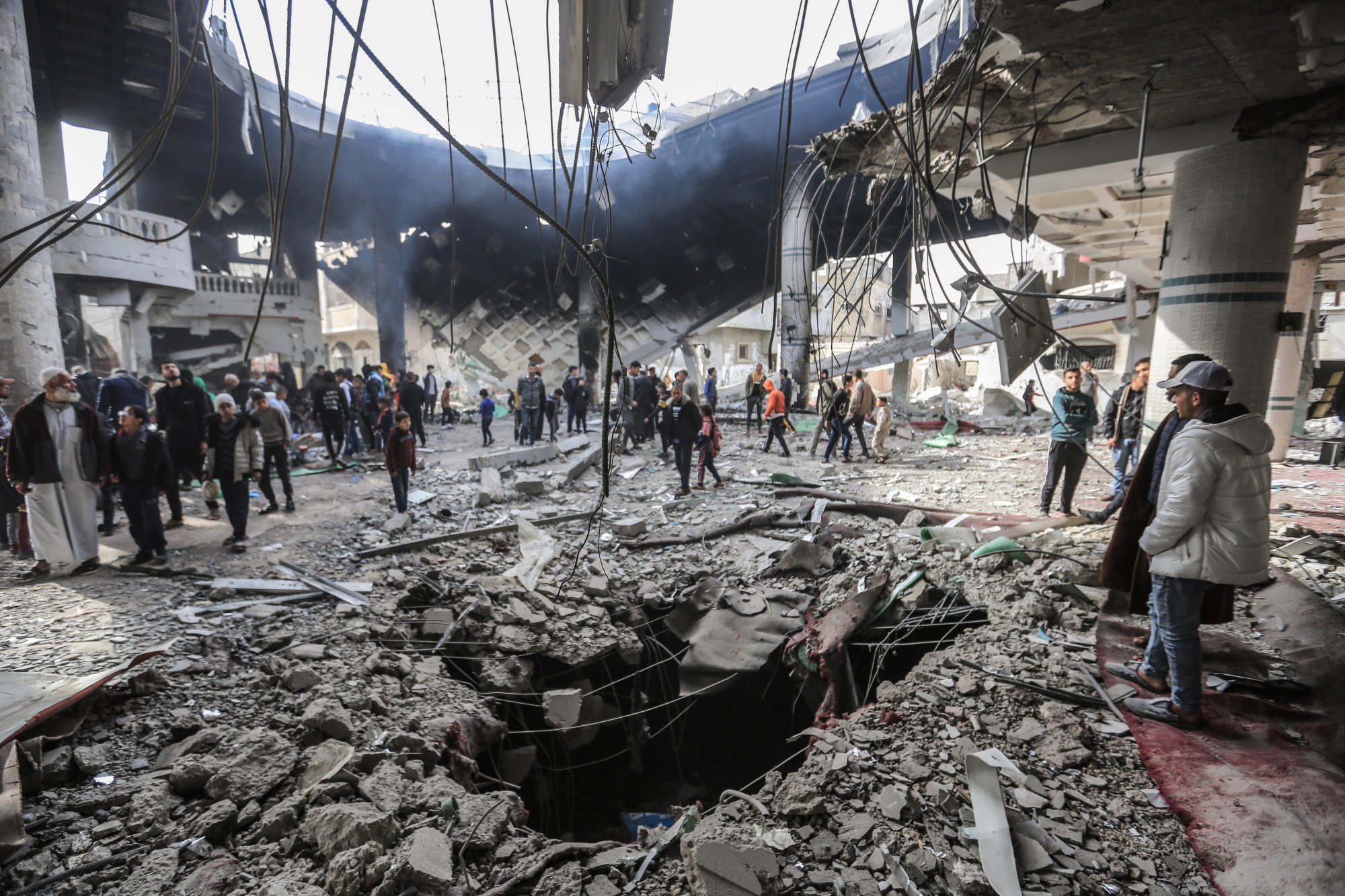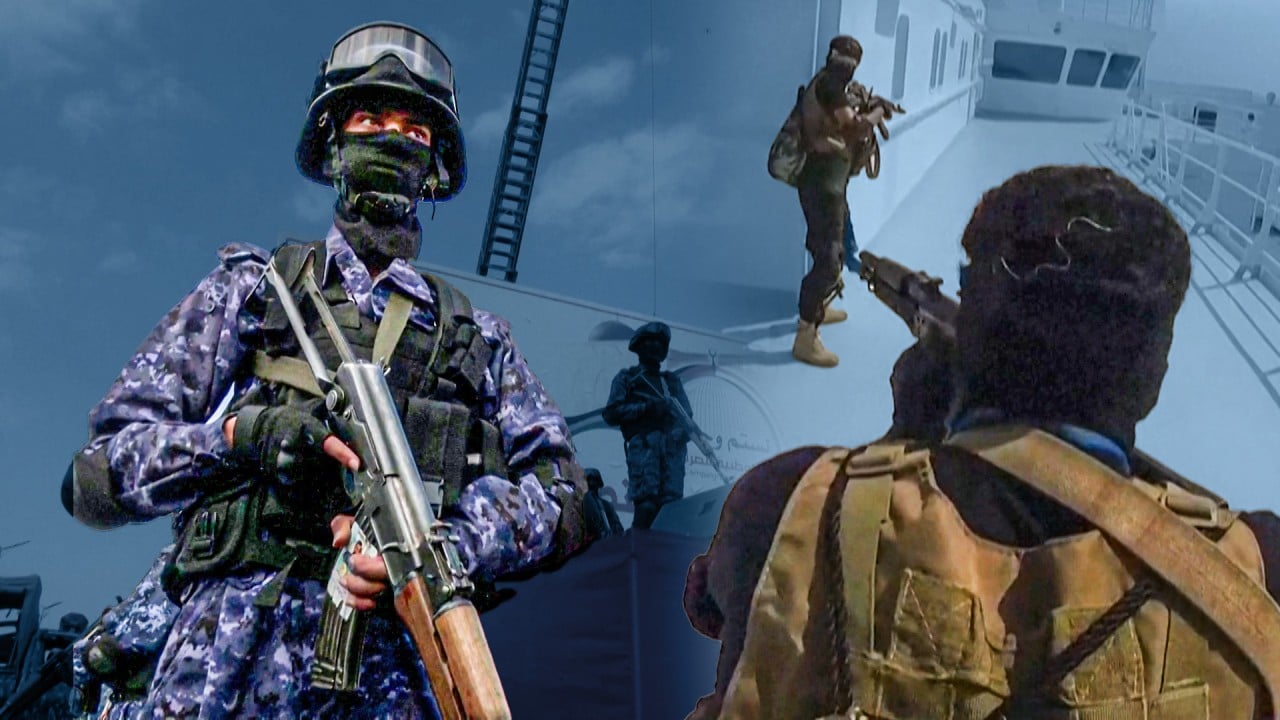
Palestinians call for China to step up pressure on Israel as they seek an end to ‘collective punishment’ on Gazans
- A third US blocking of a call for a ceasefire and Western posture on the Israel-Gaza war prompt Palestinians to turn to China for help
- Observers say a more active Global South can counter misleading portrayals of ceasefire demands as Chinese or Russian-led bids to destabilise the West
As Israel prepares for a new ground incursion into Rafah, the southern Gaza border city where more than a million people are trapped, close to 30,000 Palestinians have been killed, with over one-third of those infants or children.
“The Palestinian sense of marginalisation and vulnerability, stemming from US policies that support Israel’s crimes, have prompted them to find potential alternatives for support and solidarity, and they find it in China,” the Cyprus-based Palestinian academic said.
Beijing’s reactions signified both its support as well as its policy of not interfering or meddling in other countries’ affairs. But that should not be construed as an unwillingness to facilitate negotiations in international conflicts, Shawamreh said.
“I contend that it can engage in serious bilateral discussions with both parties, extending beyond its peace proposals, given the positive regard in which both sides of the conflict hold China, in recognition of its rising influence,” Shawamreh said.
Zoon Ahmed Khan, a research fellow at the Beijing-based Centre for China and Globalisation, said the capacity for China to act positively towards a resolution was enhanced by the fact “it has historically been sympathetic towards the Palestinian cause while maintaining pragmatic relations and broadened engagement with Israel”.
On Friday, Israel reportedly sent negotiators with the head of its Mossad intelligence service to Paris for talks on a potential truce. The news came after Knesset member Benny Gantz said new attempts were being made to reach a deal for the release of the 100 or so hostages believed to be held by Palestinian militant group Hamas.
According to New York think tank, the Council on Foreign Relations, Israel has been the largest cumulative recipient of US foreign aid since its founding, receiving about US$300 billion in total economic and military assistance.

Pro-Israel groups have popularised the narrative that those who do not support Israel’s actions are effectively sympathetic towards Hamas – the strip’s other governing force which mainly Western countries and groups have designated as a “terrorist” organisation.
On Thursday – the fourth day of hearings at the International Court of Justice – China expressed support for the right of Palestinians to engage in “armed struggle” against Israel, stressing that it could not be equated with terrorism.
“In pursuit of the right to self-determination [the Palestinian people have the right to the] use of force to resist foreign oppression and to complete the establishment of the Palestinian state,” Ma Xinmin, a Chinese foreign ministry legal adviser, said.
Shawamreh said the suggestion that China supported Hamas was similar to how Western discourses bolstered the idea that Beijing supported Russia’s war in Ukraine.
“Washington will strive to throw accusations at China and promote the idea that it has a hidden role in mobilising people to the streets and destabilising American society,” Shawamreh said, adding that the US was exploiting Israel’s “feelings of disappointment” towards Beijing’s position.
“Go back to China, where your headquarters is,” US Congresswoman Nancy Pelosi told protesters calling for a ceasefire outside her San Francisco home during the early days of the Israel-Gaza war.
“For them to call for a ceasefire is Mr Putin’s message … Make no mistake, this is directly connected to what he would like to see,” Pelosi later said about the demonstrators, adding that she would like to have the FBI investigate the financing of such protests.
China’s response to the Israel-Gaza war and Red Sea crisis under the microscope
“It’s not uncommon for politicians to attribute domestic protests or dissent to foreign influence, for reasons including deflecting responsibility, shaping public opinion or aligning with geopolitical narratives,” Khan said, adding that “alternative powers” which expressed support for Palestine posed a “direct challenge” to US hegemony.
Shadeed said China’s clear support for Palestine would have a “very powerful effect” on the conflict, giving a boost to smaller states that may have been concerned about the consequences of doing the same.
“China has an important role, but it definitely can do much, much, much more,” she said. “The trade relationship between China and Israel has been ongoing, for example. There has not been anything that was stopped, no calls for summoning the Israeli ambassador. There was not even mentions or threats of cutting ties [as Israeli offensives continue].”
“I think that most Palestinians don’t care about states any more – what they care about, which is rightly important, is liberation. They want the entire killing to stop, they want their economic situation to flourish, they want to have normal lives, access to health and education, and the right of movement.”
Israel has maintained its “declaratory decision” to reject any recognition of Palestinian statehood. Top-ranking minister Eli Cohen said recently that peace agreements should be given up “if the price of expanding peace agreements is a Palestinian state”, reinforcing Israeli Prime Minister Benjamin Netanyahu’s assertion that his country needed full security control over “the entire area in the west of Jordan”.
Israel incensed after Brazil’s Lula likens Gaza war to Holocaust
The average daily death toll in Palestine has exceeded that of any other major conflict of recent years, according to a January report by Oxfam.
But that killing could be stopped with some practical solutions, according to Vijay Prashad, historian and director of the Tricontinental Institute for Social Research. He said permanent members of the Security Council, including China, could bring forward proposals similar to those imposed on Libya during the civil war of 2011.
“To stop the bombing, China can put forward a motion for a no-fly zone over Gaza and have Egypt monitor the flights over the area,” Prashad said. “It can also propose a full arms embargo – not even dual-use technology [goods, software and technology that can be used for both civilian and military applications] should be allowed to be shipped to Israel.”
Prashad said the fact that member states were not offering such motions was “perplexing” and “part of our colonial sensibility” that the UN’s agenda could not be set by non-Western states, who were not traditionally the decision-makers.
“There are moments like when the Chinese representative to the UN [Zhang Jun] stopped the Israeli ambassador from talking in a very undignified way – so it’s not like people aren’t asserting themselves, but why not assert themselves with a resolution?”
Prashad acknowledged that the proposals would likely be vetoed by the US, making Washington appear “even more complicit in the massacre than they are right now”.
The veto power has become increasingly controversial as it effectively prevents UN action against the permanent members and their allies, leading to inaction on war crimes and crimes against humanity.
China and other countries could further consider recalling their ambassadors in Israel and removing Israeli diplomats in their countries in order to “put Israel on notice diplomatically”, Prashad said. They would be “straightforward” and “non-interventionist” moves to make a palpable stance against the unceasing violence.
Prashad said that among his Palestinian peers, there was “a lot of respect” for China’s infrastructure investment in the West Bank, but in response to the current Palestinian suffering, the Global South in general has been “pretty timid”.



